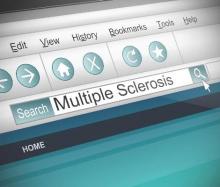NEW ORLEANS – Treatment with fingolimod improved gait impairment in treatment-naive multiple sclerosis (MS) patients and those on a previous first-line therapy in a small, single-center study.
“Fingolimod [Gilenya] is the first disease-modifying treatment shown to improve gait impairment in MS,” commented Dr. Soledad Pérez-Sánchez of Virgen Macarena University Hospital, Seville, Spain, who presented the study as a poster at the meeting held by the Americas Committee for Treatment and Research in Multiple Sclerosis.
The investigators also found that patients who were unsuccessfully treated with natalizumab (Tysabri) prior to fingolimod did not improve their gait during the course of the 6-month study. Natalizumab is a second-line drug in Spain, and fingolimod is a second-line therapy there as well, except in cases of aggressive onset of disease, according to the investigators.
Of 36 patients in the study, 24 were treatment-naïve/first-line patients (17 females and 7 males; mean age, 38.25 years), with the remaining 12 (9 females, 3 males; mean age, 44.25 years) having been treated with natalizumab. The mean duration of MS was 11.2 years in the naïve/first-line group and 17.9 years in patients on natalizumab prior to fingolimod. The mean Extended Disability Status Scale score in the two groups was similar at 3.79 and 3.38, respectively.
The investigators measured gait profile changes during fingolimod treatment with the Gaitrite Electronic System, which comprises an electronic pathway equipped with sensors designed to measure the timing and position of walking. The measurement parameters included velocity, ambulation time, and functional ambulation profile (FAP), the time to move unassisted through five common environmental terrains.
All patients completed the walking test prior to treatment and 3 months after treatment. At 6 months, 20 naïve/first-line patients and 11 patients previously on natalizumab completed the test. For each group of patients, the results prior to treatment and 3 months after were statistically similar. But significant differences were evident for naïve/first-line patients between the 3- and 6-month measures of velocity (89.10±31.03 to 100.70±23.75 cm/s; P = .01) and FAP (82.81±16.93 to 91.95±9.02 seconds; P = .01). These measurements trended toward significance when the values prior to treatment and 6 months after treatment were compared (P = .096, .077, and .065, in the same respective order).
Patients who had been treated with natalizumab did not display appreciable changes in velocity, ambulation time, and FAP.
“Our study shows that fingolimod improves gait impairment in naïve patients and those switched from first-line therapy. Our data are consistent with other clinical measures published so far which have pointed to better outcomes with fingolimod in naïve/first-line patients than in natalizumab-switched patients,” Dr. Pérez-Sánchez and her colleagues said.
The single-center study design and small number of patients limit any conclusions on the use of fingolimod as a gait-improving therapy in MS until further studies are completed, according to the researchers.
Funding was provided by Novartis. Dr. Pérez-Sánchez had no disclosures.


